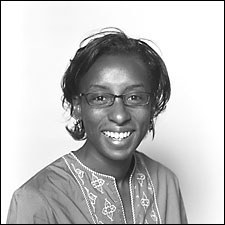Claudine Gay appointed professor of government

Political scientist Claudine Gay, a scholar whose work has illuminated how race informs political behavior, has been appointed professor of government in Harvard University’s Faculty of Arts and Sciences, effective July 1.
Gay, 35, comes to Harvard from Stanford University, where she has been a member of the faculty since 2000. She is currently associate professor and director of undergraduate studies in Stanford’s department of political science.
“Professor Gay is a first-rate analyst poised to become her generation’s leading figure in the study of African-American political behavior, and minority politics more generally,” says William C. Kirby, Edith and Benjamin Geisinger Professor of History and dean of the Faculty of Arts and Sciences. “She has already produced striking work that cuts against the grain of recent scholarship. Her solid reputation as an ingenious and exacting researcher is matched by her devotion to teaching, as evidenced by her strong departmental and university service on behalf of Stanford’s students.”
Gay has studied how race – both that of individual voters and that of their elected officials – affects citizens’ relationship with their government. She has found that whites are 5 to 18 percent less likely to vote when they are represented by an African American in Congress, while African Americans are no more likely to vote when represented by someone of the same race. Gay has also shown that regardless of ideology, whites are less likely to trust, approve of, or contact African-American representatives. The political behavior of black citizens, by contrast, is largely unaffected by elected officials’ race.
In studies linking socioeconomic standing and political attitudes, Gay has found that the salience of race to African Americans – including the perception of racial discrimination – is significantly affected by neighborhood quality, with strong material roots in factors such as clean streets, effective city services, and such amenities as good grocery stores. She has also shown that socially engaged African Americans who live in neighborhoods with high-status blacks are more likely to perceive racial discrimination, a finding that shows how social networks can foster blacks’ perceptions of discrimination.
Gay’s analysis of animus between blacks and Latinos also underscores the importance of neighborhood: African Americans who live in neighborhoods where Latinos are economically advantaged are more likely to express anti-Latino hostility than are African Americans who live in communities where blacks are economically advantaged.
Gay received a B.A. in economics from Stanford in 1992 and a Ph.D. in government from Harvard in 1998. She worked as a consultant at the Strategic Decisions Group of Boston and was a visiting fellow at the Public Policy Institute of California before joining the Stanford faculty as an assistant professor of political science in 2000.
In recent years, Gay has held fellowships with the Center for Advanced Study in the Behavioral Sciences, the American Association of University Women, and the Stanford Institute for Quantitative Study of Society. She won Harvard’s Toppan Prize for Best Dissertation in Political Science in 1998 and Stanford’s Anna Laura Myers Award for Best Thesis in Economics in 1992.




